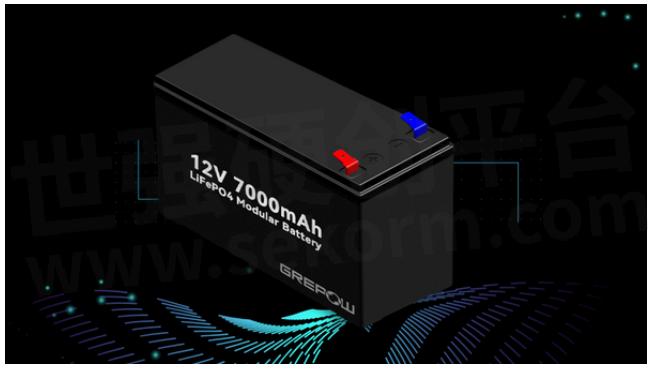12V UPS Battery FAQs

Uninterruptible Power Supply (UPS) systems play a crucial role in safeguarding electronic devices from unexpected power interruptions. The heart of a UPS system is its battery, and one of the most commonly used battery voltages is 12V. In this article, we'll explore frequently asked questions about 12V UPS battery to help users better understand their functionality and maintenance.
Why is a 12V battery usually used in UPS?
A 12V battery is a popular choice for UPS systems due to its versatility and compatibility. Many electronic devices and systems are designed to operate with 12V DC power, making these batteries a suitable and widely available option for UPS applications. Despite the availability of 24V and 48V batteries, opting for them can result in severe damage to the house and pose risks to loved ones. Hence, the industry standard has remained unchanged for years, with the 12V UPS battery being the preferred choice for its ease of management and installation in conjunction with the inverter. In smaller UPS systems, a commonly used battery is the 12V 7Ah, capable of powering devices such as routers, modems, surveillance cameras, and small electronic gadgets during power outages.

Fig.1
12V UPS battery: Lead-Acid vs lithium
Choosing between lead-acid and lithium-ion 12V UPS battery involves trade-offs. Lead-acid batteries are heavier, bulkier, and have a shorter lifespan but come with a lower initial cost. On the other hand, lithium-ion batteries offer higher energy density, making them more compact and lightweight. They have a longer lifespan, faster charging times, but come with a higher upfront cost. Consider factors such as space, weight constraints, lifespan requirements, and budget considerations to make an informed decision based on your specific needs and preferences.
In general, you can replace 12V UPS lead-acid batteries with 12V UPS lithium battery. However, while replacing lead-acid batteries with lithium batteries can offer benefits such as longer lifespan and higher energy density, it's crucial to follow manufacturer guidelines and ensure compatibility to prevent damage to the UPS system or safety issues. Always prioritize safety and adhere to recommended practices throughout the replacement process.
How many hours will a 12V 7Ah battery last?
The runtime of a 12V 7Ah battery depends on the power consumption of the connected devices and the efficiency of the UPS system. As a general guideline, a 7Ah battery can provide power for approximately 30 minutes to an hour, depending on the load. The method for calculating the power supply time of UPS with different battery capacities is as follows:
1. Determine the UPS Load:
Identify the power consumption (in watts) of the devices connected to the UPS. This information is usually provided on the devices or in their user manuals.
2. Convert Load to Amps:
Calculate the load in amps by dividing the total power (in watts) by the UPS output voltage (typically 120V or 230V).
For example:
Load = 300 watts
Amps = 300W / 120V = 2.5A
3. Identify Battery Capacity:
Determine the ampere-hour (Ah) rating of the batteries. This information is usually marked on the batteries themselves.
4. Calculate Runtime:
Use the formula: Runtime (in hours) = Battery Capacity (Ah) / Load (Amps)
For example:
Battery Capacity = 10Ah
Runtime = 10Ah / 2.5A = 4 hours
5. Adjust for Efficiency:
Consider the efficiency of the UPS system. Multiply the calculated runtime by the UPS efficiency factor (usually expressed as a percentage).
For example:
If UPS efficiency is 90%, adjust runtime: 4 hours * 0.9 = 3.6 hours
Can I replace a 12V 7Ah battery with a 12V 12Ah battery?
The primary difference between a 7Ah and 12Ah UPS battery lies in their capacity to store electrical energy. A 12Ah battery has a higher capacity and can generally power devices for a more extended period during a power outage compared to a 7Ah battery. In many cases, you can replace a 12V 7Ah battery with a 12V 12Ah battery in a UPS system. Upgrading to a higher Ah (ampere-hour) rating increases the battery's capacity, providing longer backup power. However, it's crucial to ensure that the physical dimensions of the new battery fit within the UPS enclosure.
Conclusion
Understanding the basics of 12V UPS battery is essential for optimizing the performance and longevity of your uninterruptible power supply system. Whether you are considering a replacement or upgrading your current battery, being informed about these FAQs can help you make informed decisions to ensure reliable backup power for your electronic devices. As a global leader in lithium battery cell manufacturing, Grepow offers professional customization solutions for 12V and 24V UPS battery and Battery Management Systems (BMS), catering to your specific application requirements.
- +1 Like
- Add to Favorites
Recommend
- How to Solve the Imbalance between Li-ion Battery Pack Cells and the usual maintenance of Lithium-ion batteries
- Uninterrupted Safety: Understanding Lithium-ion Batteries in UPS Technology
- Nippon Chemi-Con and Asahi Carbon Collaborated on Developing Novel Conductive Carbon “NH Carbon™” for Lithium-Ion Batteries
- Can Lithium Batteries and Lead Acid Batteries be Used Together?
- WACKER Presents Silicone Materials for Enhancing the Safety of Lithium-Ion Batteries
- Things You Need to Know About CCC Certification for Lithium Batteries
- Wevo Silicones Mitigate Thermal Runaway Propagation and Offer More Safety for Lithium-ion Batteries
- Sodium Ion VS Lithium Ion Battery – are Sodium Batteries Better?
This document is provided by Sekorm Platform for VIP exclusive service. The copyright is owned by Sekorm. Without authorization, any medias, websites or individual are not allowed to reprint. When authorizing the reprint, the link of www.sekorm.com must be indicated.





























































































































































































































































































































































































































































































































































































































































































































































































































































































